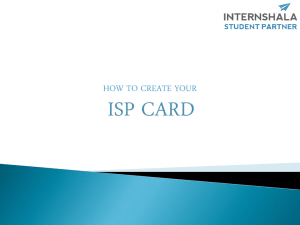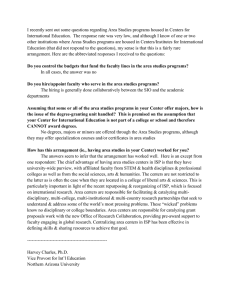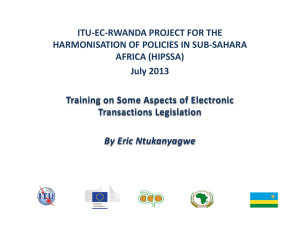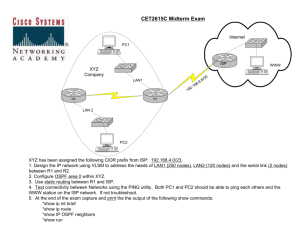Content Regulation Professor Ian Walden
advertisement
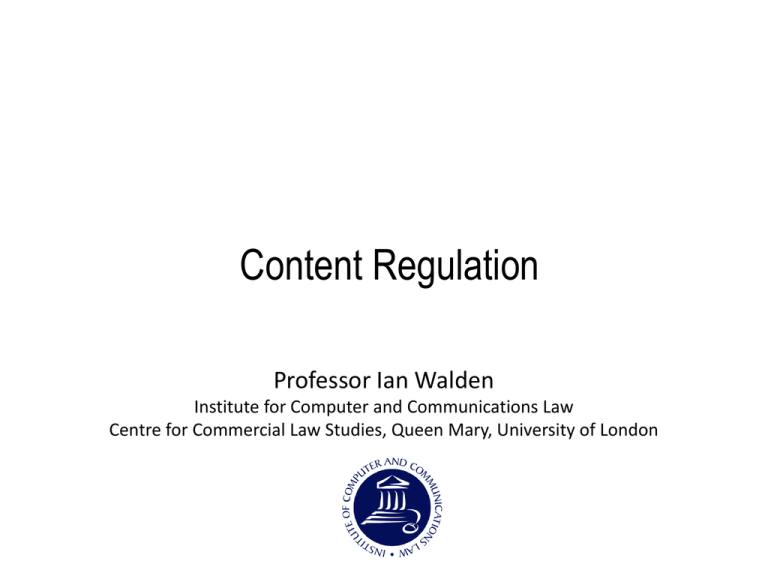
Content Regulation Professor Ian Walden Institute for Computer and Communications Law Centre for Commercial Law Studies, Queen Mary, University of London What is content regulation? • “Internet content regulation refers to any type of legislation by governments or regulatory authorities directed at: Censoring information and communication on the internet based on its subject matter, and, Controlling, or attempting to control, access to internet sites based on subject matter” Policy Statement: The impact of internet content regulation International Chamber of Commerce What kind of content is regulated? • • • • • • • Age-restricted material Obscene material Political material Material which impacts upon ‘national security’ Defamatory material Advertising Some types of transactions The Challenge of Technology • Applying traditional legal concepts to the internet can present difficulties, e.g.: – Child sexual abuse images generally illegal, BUT: • Computer-generated images? • Differential age limits • Pseudo-photographs, tracings – Online gambling • Approval of premises? • Games used Other online challenges • Flexibility of internet content • Ease of publication online - Social media & email as distribution channels • ‘Freedom of expression’ - Balancing with need to prevent crime, etc. • Is the user an adult or a child? • Can be difficult to locate / identify source of unlawful content - Use of pseudonyms, encryption, proxy servers & webbased remailing services to preserve anonymity The Role of Intermediaries • To what extent should an ISP be liable for content provided by a third party? • Models for ISP liability • ISP as information carrier • ISP as information distributor • ISP as information controller • Developing international consensus that ISP should not be strictly liable • degree of liability varies Examples of ISP Liability Provisions • European Union - Electronic Commerce Directive 2000 • ‘mere conduit’, ‘caching’ & ‘hosting’ - Copyright in the Information Society Directive 2001 • USA - Communications Decency Act 1996 • Civil liability only - Digital Millennium Copyright Act 1998 • Barbados - Electronic Transactions Act 2001, Part VII • Trinidad & Tobago - Electronic Transactions Act 2011, Part IV Methods of content regulation • Regulation by contract • Between user and intermediary • Acceptable Use Policies • Court or administrative orders and injunctions • Take-down & block access • e.g. Paramount Home Entertainment International v British Sky Broadcasting Ltd. (2013) • Notice and take-down • USA: Digital Millennium Copyright Act 1998 • Specified procedures, including ‘put-back’ Technological methods • Blocking and filtering software • blocking by URL, keyword or image • P.I.C.S. (Platform for Internet Content Selection) • age-verification Tools • Options for use • voluntary use – there for those who want it • obligatory in some contexts • e.g. schools & public libraries • government controlled filtering at the ISP level Cross-border Content Regulation • The international nature of the internet • Geographical boundaries do not apply online • Content put online in one country is visible online in all countries • Cross-border regulatory problems • Advertising • e.g. banking & financial services • Sale of restricted products • e.g. Viagra Cross-border Content Regulation • Cross-border regulatory problems • Obscene & indecent material • Differing national standards • UK: “tendency to deprave and corrupt” • USA: “sexual depictions appealing to the prurient interest” • Some consensus on child pornography, BUT: • how old is a child? • adults appearing to be children Cross-border Content Regulation • Defamation • Who is the publisher / otherwise responsible? • Liability standards vary widely • Where does publication take place: • Place of uploading… • …or the place where it is downloaded? • Gutnick v Dow Jones [2001] Cross-border Content Regulation • Nature of the Internet • Many overlapping jurisdictions competing to control information online • Who has the right to regulate? • The rules of Public International Law • The effects doctrine • eCommerce has effects everywhere… • …so every state has jurisdiction? Enforcement issues • Intergovernmental disputes & economic sanctions • • • Attempts to enforce against company assets in a third country For criminal offences and possible arrest of travelling company officers • • e.g. Antigua v USA (2007): suspend $21m in annual payments of IPR licence fees e.g. Google in Italy Deliberate lawbreaking Content Regulation Options • ‘Country of receipt’ • E.g. Gutnick v Dow Jones • ‘Country of Origin’ • E.g. WTO GATS • Article XIV derogations • Mutual recognition • e.g. electronic signatures and certification authorities • ‘Directed’ or ‘targeting’ • E.g. IOSCO policy on investment advertisements ‘Country of Origin’ Regulation • For: • Easier to identify appropriate law • Commercial advantages of ‘country of origin’ rule, backed by international legal convergence • Against: • Danger of downwards regulatory competition • Cultural barriers to international standards • e.g. obscenity standards vary • e.g. LICRA v Yahoo! Inc. • e.g. different political cultures and criticism of the state Concluding Remarks • Difficulty of Internet Content Regulation – Biggest problem: cross-border nature of the internet • differing laws in differing jurisdictions • Most effective means of regulation? – Harmonisation/convergence of national laws – Directed or targeting intervention criteria
